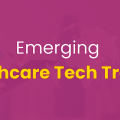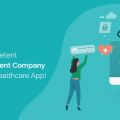Significant Healthcare Tech Trends to watch out for!

Healthcare is an ever-evolving sector that continues to expand its reach and influence with the help of avant-garde technologies. Increased awareness of health and disease, along with advances in technology that support it, make healthcare a booming industry. Advancements in the healthcare industry will continue to grow in leaps and bounds as medical technology continues to advance at a rapid rate. The emergence of cutting-edge technologies comes with game-changing healthcare solutions that open up new avenues of treatment and transforms healthcare diagnosis altogether.
Here are the most significant healthcare technology trends! Take a look at these amazing trends and learn what they bring to the table. Every healthcare provider should be aware of the ongoing healthcare technology trends to stay relevant in the ever-evolving healthcare sector.
Biggest Healthcare Technology Trends
Drones for Healthcare Delivery
Drones for delivery are one of the most recent and promising healthcare technology trends. Already, companies like Amazon are testing the waters with their drones. Drones are UAVs (Unmanned Ariel Vehicles) that people use for transporting healthcare-related items like medical supplies, vaccines, etc. to remote areas that are difficult to reach otherwise. Take a close look at some of the use cases.
Authorities can use drones to transport emergency medical supplies and other equipment to remote disaster-stricken locations. This way, healthcare providers and first responders can provide medical care & assistance quickly to the ones in need. And, the best part is that authorities can easily offer such aid regardless of the physical transportation barriers that the disaster has caused. Drones also make it easy to deliver vaccines to locations that are hard to reach using traditional means of transportation.
Besides, the use of drones makes it easier and quicker to transport stuff like medicines, blood, and diagnostic test samples. Such a service proves immensely beneficial when you need to ensure the timely delivery of critical medical supplies. If Drones are equipped with telemedicine technology, you can also use them to offer doctor consultations and medical exams to patients residing in underserved and remote areas.
Drones for healthcare delivery have the potential to improve access to healthcare, boost the efficiency of healthcare services, and reduce costs at the same time. However, drones may involve regulatory and logistic challenges. And, you need to address such challenges for obtaining the best results from Drone usage.
Precision Medicine
A new term will dominate the healthcare industry in future years. It’s called precision medicine. Here, medical professionals collect information about an individual’s body proteins and genes. They use this data for diagnosing, treating, or preventing certain diseases. In other words, medical professionals leverage information about a person’s unique genetic built to tailor personalized treatment methodologies.
Precision medicine works wonders in cancer treatment. Physicians can gather crucial data about a tumor inside the human body and create a treatment plan accordingly. Doctors can also track the progress of the treatment and medication and create a prognosis.
Precision medicine is one of the most transformative emerging healthcare technology trends and this approach is gaining momentum due to the advances made in the fields of genomics and personalized medicine.
AI in Healthcare Diagnostics
Computer algorithms will play a greater role in the diagnosis of medical conditions due to the increased use of AI in healthcare.
As the human mind is a complex creation of memories, places, and systems; technology can now understand how things work and how they relate. For example, an algorithm can determine if two people are connected while sitting next to each other in a room or how it relates to money when one finds it difficult to make decisions.
This is possible due to the mind’s ability to communicate with each other and with technology.
The healthcare industry is leveraging this capability of Artificial Intelligence to gain unimaginable treatment outcomes. For example, an AI algorithm could determine if someone has a chronic disease and whether or not they are suffering from symptoms that are related to that disease. AI-powered healthcare solutions and tools are helping medical professionals analyze huge chunks of patient data for identifying patterns and trends. AI combined with Machine Learning, a subset of AI, can analyze data to identify patterns and offer personalized recommendations for medication or treatment based on the distinct health history and objectives of an individual. This is helping healthcare providers improve the correctness of healthcare metrics and also optimize the effectiveness of personalized treatment plans.
AI is one of the game-changing healthcare mobile app trends that’s proving its potential in the medical sector by improving diagnostic outcomes, reducing clinical errors, and personalizing treatment plans.
3D Printing
3D Printing is one of the most innovative healthcare technology trends and can completely transform the way healthcare devices are manufactured and distributed. The healthcare sector is using this technology to build customized medical devices and treatment options tailored to individual patient requirements. Software development services are using cutting-edge technologies like AR (Augmented Reality) and VR (Virtual Reality) to achieve the best outcomes from 3D printing. Check out some of the use case examples!
Prosthetics
With 3D printing, you can create customized prosthetics tailored based on a patient’s unique anatomy and requirements. This makes way for improved comfort and better treatment outcomes.
Implants
You can utilize 3D printing for customizing implants as well. Such implants perfectly match a person’s particular anatomy and integrate better with that person’s body, leading to the best outcomes.
Medical Models
You can create physical models of the human anatomy to provide much-needed pre-surgery understanding & planning and results in better decision-making.
Surgical Guides & Tools
3D printing enables healthcare industry experts to create surgical tools and guides that are tailored to a particular human anatomy. This minimizes the risks of surgical errors and improves treatment outcomes considerably.
Organ Printing
Organ printing is one of the most revolutionary healthcare technology trends that is expected in the future years. Researchers are exploring this approach. They are using 3D printing for creating functional organs used during transplants. This concept is in its formative stages but holds immense potential to disrupt the future of the healthcare industry.
Digital health coaches
A growing healthcare technology trend, digital coaches will take the world by storm in 2023. And, it has nothing to do with eating healthier foods. Coaches will train their clients in how to use modern technology to improve their wellness and health. Many people are already using this type of coaching today, but through the use of social media, smartphones, and other devices.
A health coach can also provide resources that match their level, such as certification programs or advanced training courses. Clients can either purchase one or hire a coach to help them navigate the technology on their own. With the system of digital healthcare coaching, it becomes easy for individuals to set wellness goals for themselves and achieve those goals under the guidance of professionals.
Health coaches connect with their clients on a personal level and guide them through the process of finding a wellness coach, signing up for training sessions, and actively practicing what they are learning in those sessions. Experts will guide individuals seeking medical advice, support, and guidance at any time and from anywhere. Coaches collect an individual’s health data using technologies like wearable apps and other smart devices or healthcare software solutions. Experts then analyze this data and track their client’s progress. Based on these results, coaches provide personalized advice on wellness parameters.
In Conclusion
Emerging technologies have already proved their potential in transforming the Healthcare Industry. More advanced technologies are expected to create a buzz in the coming years. New technologies promise to brighten the future of medical diagnoses and treatment. Hence, healthcare providers must necessarily explore these technology trends to stay ahead of the competition.
However, implementing new technological trends in your healthcare service offerings require professional expertise and sound technical knowledge. So, several providers are partnering with an experienced healthcare app development company, to smarten their service offerings using innovative technologies.
Other articles and publications:
Articles and publications of other companies:
 Pixel Values Technolabs: Your Trusted Partner for The Best Codeigniter Development Services In India
Pixel Values Technolabs: Your Trusted Partner for The Best Codeigniter Development Services In India
- +1 (469) 277-0804
- 8305 Tripoli Trl, Frisco, TX 75034, United States
- www.biz4solutions.com/











